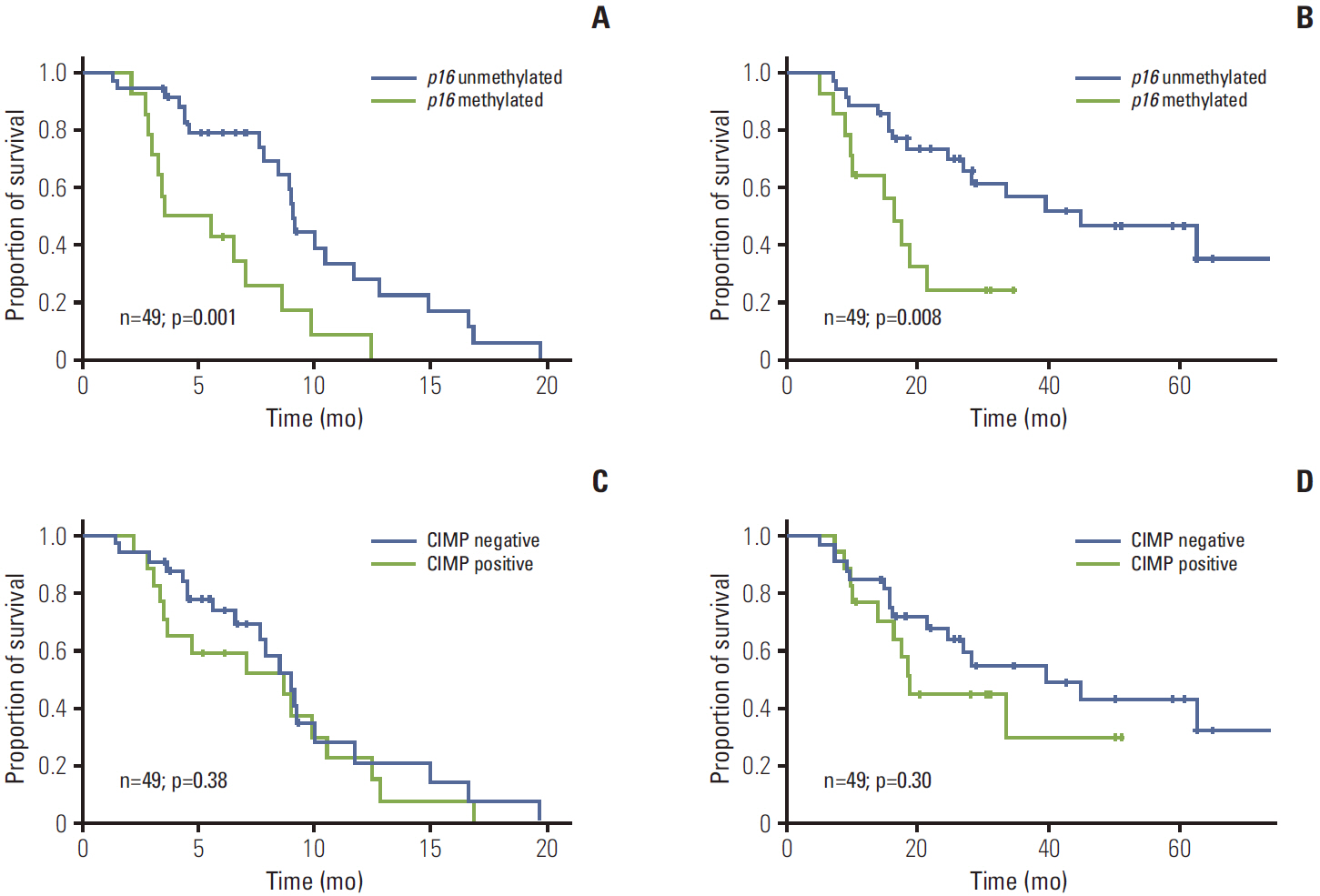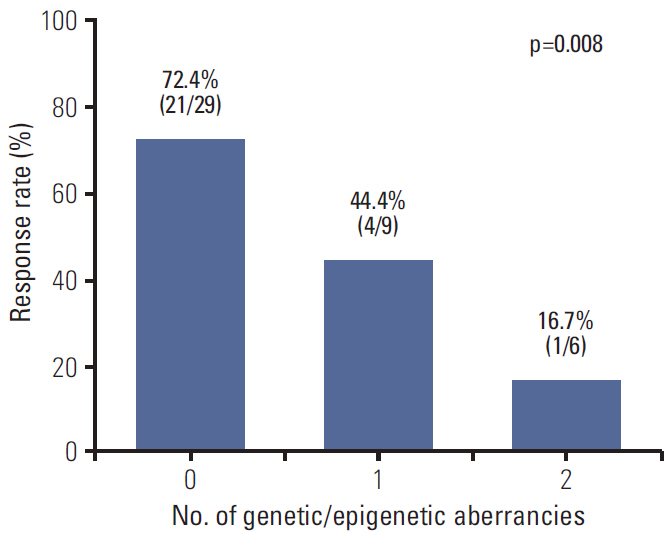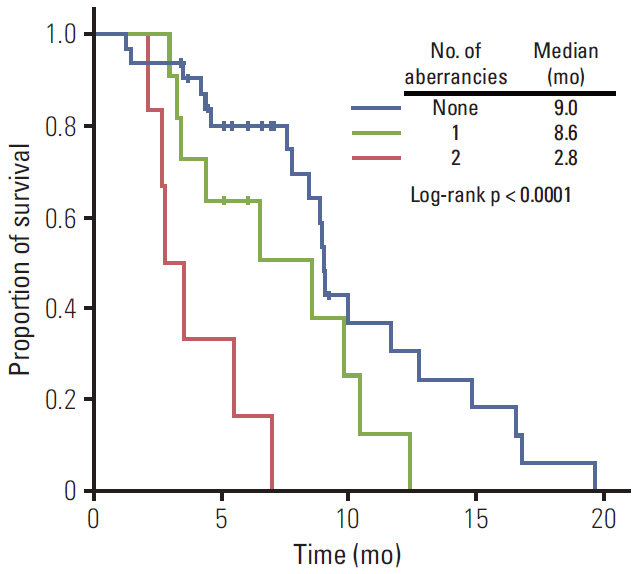Cancer Res Treat.
2016 Jan;48(1):208-215. 10.4143/crt.2014.314.
p16 Hypermethylation and KRAS Mutation Are Independent Predictors of Cetuximab Plus FOLFIRI Chemotherapy in Patients with Metastatic Colorectal Cancer
- Affiliations
-
- 1Department of Internal Medicine, Seoul National University Bundang Hospital, Seongnam, Korea.
- 2Institute for Cancer Research, College of Medicine, Yonsei University, Seoul, Korea. vvswm513@yuhs.ac
- 3Department of Internal Medicine, Yonsei University College of Medicine, Seoul, Korea.
- 4Department of Surgery, Yonsei University College of Medicine, Seoul, Korea.
- KMID: 2152277
- DOI: http://doi.org/10.4143/crt.2014.314
Abstract
- PURPOSE
Hypermethylation of the CpG island of p16(INK4a) occurs in a significant proportion of colorectal cancer (CRC). We aimed to investigate its predictive role in CRC patients treated with 5-fluorouracil, leucovorin, irinotecan (FOLFIRI), and cetuximab.
MATERIALS AND METHODS
Pyrosequencing was used to identify KRAS mutation and hypermethylation of 6 CpG island loci (p16, p14, MINT1, MINT2, MINT31, and hMLH1) in DNA extracted from formalin-fixed paraffin-embedded specimens. Logistic regression and Cox regression were performed for analysis of the relation between methylation status of CpG island methylator phenotype (CIMP) markers including p16 and clinical outcome.
RESULTS
Hypermethylation of the p16 gene was detected in 14 of 49 patients (28.6%) and showed significant association with KRAS mutation (Fisher exact, p=0.01) and CIMP positivity (Fisher exact, p=0.002). Patients with p16-unmethylated tumors had significantly longer time to progression (TTP; median, 9.0 months vs. 3.5 months; log-rank, p=0.001) and overall survival (median, 44.9 months vs. 16.4 months; log-rank, p=0.008) than those with p16-methylated tumors. Patients with both KRAS and p16 aberrancy (n=6) had markedly shortened TTP (median, 2.8 months) compared to those with either KRAS or p16 aberrancy (n=11; median, 8.6 months; p=0.021) or those with neither (n=32; median, 9.0 months; p < 0.0001). In multivariate analysis, KRAS mutation and p16 methylation showed independent association with shorter TTP (KRAS mutation: hazard ratio [HR], 3.21; p=0.017; p16 methylation: HR, 2.97; p=0.027).
CONCLUSION
Hypermethylation of p16 was predictive of clinical outcome in metastatic CRC patients treated with cetuximab and FOLFIRI, irrespective of KRAS mutation.
Keyword
MeSH Terms
Figure
Reference
-
References
1. Fearon ER, Vogelstein B. A genetic model for colorectal tumorigenesis. Cell. 1990; 61:759–67.
Article2. Jass JR. Classification of colorectal cancer based on correlation of clinical, morphological and molecular features. Histopathology. 2007; 50:113–30.
Article3. Kelley RK, Wang G, Venook AP. Biomarker use in colorectal cancer therapy. J Natl Compr Canc Netw. 2011; 9:1293–302.
Article4. Schmoll HJ, Van Cutsem E, Stein A, Valentini V, Glimelius B, Haustermans K, et al. ESMO Consensus Guidelines for management of patients with colon and rectal cancer. a personalized approach to clinical decision making. Ann Oncol. 2012; 23:2479–516.
Article5. Van Cutsem E, Kohne CH, Lang I, Folprecht G, Nowacki MP, Cascinu S, et al. Cetuximab plus irinotecan, fluorouracil, and leucovorin as first-line treatment for metastatic colorectal cancer: updated analysis of overall survival according to tumor KRAS and BRAF mutation status. J Clin Oncol. 2011; 29:2011–9.
Article6. Andreyev HJ, Norman AR, Cunningham D, Oates JR, Clarke PA. Kirsten ras mutations in patients with colorectal cancer: the multicenter "RASCAL" study. J Natl Cancer Inst. 1998; 90:675–84.
Article7. Hutchins G, Southward K, Handley K, Magill L, Beaumont C, Stahlschmidt J, et al. Value of mismatch repair, KRAS, and BRAF mutations in predicting recurrence and benefits from chemotherapy in colorectal cancer. J Clin Oncol. 2011; 29:1261–70.
Article8. Toyota M, Ohe-Toyota M, Ahuja N, Issa JP. Distinct genetic profiles in colorectal tumors with or without the CpG island methylator phenotype. Proc Natl Acad Sci U S A. 2000; 97:710–5.
Article9. Barault L, Charon-Barra C, Jooste V, de la Vega MF, Martin L, Roignot P, et al. Hypermethylator phenotype in sporadic colon cancer: study on a population-based series of 582 cases. Cancer Res. 2008; 68:8541–6.
Article10. Ahn JB, Chung WB, Maeda O, Shin SJ, Kim HS, Chung HC, et al. DNA methylation predicts recurrence from resected stage III proximal colon cancer. Cancer. 2011; 117:1847–54.
Article11. Kim WY, Sharpless NE. The regulation of INK4/ARF in cancer and aging. Cell. 2006; 127:265–75.
Article12. Liggett WH Jr, Sidransky D. Role of the p16 tumor suppressor gene in cancer. J Clin Oncol. 1998; 16:1197–206.
Article13. Bennecke M, Kriegl L, Bajbouj M, Retzlaff K, Robine S, Jung A, et al. Ink4a/Arf and oncogene-induced senescence prevent tumor progression during alternative colorectal tumorigenesis. Cancer Cell. 2010; 18:135–46.
Article14. Esteller M, Gonzalez S, Risques RA, Marcuello E, Mangues R, Germa JR, et al. K-ras and p16 aberrations confer poor prognosis in human colorectal cancer. J Clin Oncol. 2001; 19:299–304.15. Karamitopoulou E, Zlobec I, Koumarianou A, Patsouris ES, Peros G, Lugli A. Expression of p16 in lymph node metastases of adjuvantly treated stage III colorectal cancer patients identifies poor prognostic subgroups: a retrospective analysis of biomarkers in matched primary tumor and lymph node metastases. Cancer. 2010; 116:4474–86.16. Bihl MP, Foerster A, Lugli A, Zlobec I. Characterization of CDKN2A(p16) methylation and impact in colorectal cancer: systematic analysis using pyrosequencing. J Transl Med. 2012; 10:173.
Article17. Crea F, Giovannetti E, Cortesi F, Mey V, Nannizzi S, Gallegos Ruiz MI, et al. Epigenetic mechanisms of irinotecan sensitivity in colorectal cancer cell lines. Mol Cancer Ther. 2009; 8:1964–73.
Article18. Gallagher SJ, Thompson JF, Indsto J, Scurr LL, Lett M, Gao BF, et al. p16INK4a expression and absence of activated B-RAF are independent predictors of chemosensitivity in melanoma tumors. Neoplasia. 2008; 10:1231–9.
Article19. Finn RS, Crown JP, Boer K, Lang I, Parikh RJ, Breazna A, et al. Results of a randomized phase 2 study of PD 0332991, a cyclin-dependent kinase (CDK) 4/6 inhibitor, in combination with letrozole vs letrozole alone for first line treatment of ER+/HER2- advanced breast cancer (BC). Ann Oncol. 2012; 23(Suppl 2):ii43–5.20. Samowitz WS, Albertsen H, Herrick J, Levin TR, Sweeney C, Murtaugh MA, et al. Evaluation of a large, population-based sample supports a CpG island methylator phenotype in colon cancer. Gastroenterology. 2005; 129:837–45.
Article21. Shen L, Catalano PJ, Benson AB 3rd, O'Dwyer P, Hamilton SR, Issa JP. Association between DNA methylation and shortened survival in patients with advanced colorectal cancer treated with 5-fluorouracil based chemotherapy. Clin Cancer Res. 2007; 13:6093–8.22. Ogino S, Meyerhardt JA, Kawasaki T, Clark JW, Ryan DP, Kulke MH, et al. CpG island methylation, response to combination chemotherapy, and patient survival in advanced microsatellite stable colorectal carcinoma. Virchows Arch. 2007; 450:529–37.
Article23. Markl ID, Cheng J, Liang G, Shibata D, Laird PW, Jones PA. Global and gene-specific epigenetic patterns in human bladder cancer genomes are relatively stable in vivo and in vitro over time. Cancer Res. 2001; 61:5875–84.24. Claus R, Lucas DM, Stilgenbauer S, Ruppert AS, Yu L, Zucknick M, et al. Quantitative DNA methylation analysis identifies a single CpG dinucleotide important for ZAP-70 expression and predictive of prognosis in chronic lymphocytic leukemia. J Clin Oncol. 2012; 30:2483–91.
Article25. Douillard JY, Oliner KS, Siena S, Tabernero J, Burkes R, Barugel M, et al. Panitumumab-FOLFOX4 treatment and RAS mutations in colorectal cancer. N Engl J Med. 2013; 369:1023–34.
Article
- Full Text Links
- Actions
-
Cited
- CITED
-
- Close
- Share
- Similar articles
-
- Retrospective Analysis of Patients Treated with Cetuximab plus FOLFIRI for Previous Irinotecan-combined Chemotherapy in Metastatic Colorectal Cancer
- Use of a High-Throughput Genotyping Platform (OncoMap) for RAS Mutational Analysis to Predict Cetuximab Efficacy in Patients with Metastatic Colorectal Cancer
- Chemotherapy for Colorectal Cancer
- A Phase II Study of Cetuximab (Erbitux(R)) plus FOLFIRI for Irinotecan and Oxaliplatin-refractory Metastatic Colorectal Cancer
- Impact of KRAS Mutation Status on Outcomes in Metastatic Colon Cancer Patients without Anti-Epidermal Growth Factor Receptor Therapy




